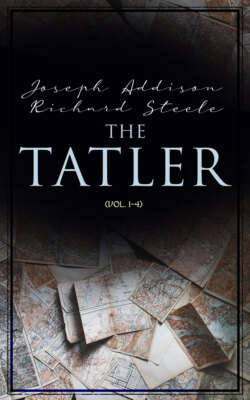Читать книгу The Tatler (Vol. 1-4) - Joseph Addison - Страница 159
Will's Coffee-house, July 15.
ОглавлениеThe discourse happened this evening to fall upon characters drawn in plays, and a gentleman remarked, that there was no method in the world of knowing the taste of an age, or period of time so good, as by the observations of the persons represented in their comedies. There were several instances produced, as Ben Jonson's bringing in a fellow smoking as a piece of foppery;406 "But," said the gentleman who entertained us on this subject, "this matter is nowhere so observable as in the difference of the characters of women on the stage in the last age, and in this. It is not to be supposed that it was a poverty of genius in Shakespeare, that his women made so small a figure in his dialogues; but it certainly is, that he drew women as they then were in life; for that sex had not in those days that freedom in conversation; and their characters were only, that they were mothers, sisters, daughters, and wives. There were not then among the ladies, shining wits, politicians, virtuosas, free-thinkers, and disputants; nay, there was then hardly such a creature even as a coquette: but vanity had quite another turn, and the most conspicuous woman at that time of day was only the best housewife. Were it possible to bring into life an assembly of matrons of that age, and introduce the learned Lady Woodby into their company, they would not believe the same nation could produce a creature so unlike anything they ever saw in it. But these ancients would be as much astonished to see in the same age so illustrious a pattern to all who love things praiseworthy, as the divine Aspasia.407 Methinks, I now see her walking in her garden like our first parent, with unaffected charms, before beauty had spectators, and bearing celestial conscious virtue in her aspect. Her countenance is the lively picture of her mind, which is the seat of honour, truth, compassion, knowledge, and innocence.
There dwells the scorn of vice and pity too.
In the midst of the most ample fortune, and veneration of all that behold and know her, without the least affectation, she consults retirement, the contemplation of her own being, and that supreme power which bestowed it. Without the learning of schools, or knowledge of a long course of arguments, she goes on in a steady course of uninterrupted piety and virtue, and adds to the severity and privacy of the last age all the freedom and ease of this. The language and mien of a Court she is possessed of in the highest degree; but the simplicity and humble thoughts of a cottage, are her more welcome entertainments. Aspasia is a female philosopher, who does not only live up to the resignation of the most retired lives of the ancient sages, but also to the schemes and plans which they thought beautiful, though inimitable. This lady is the most exact economist, without appearing busy; the most strictly virtuous, without tasting the praise of it; and shuns applause with as much industry, as others do reproach. This character is so particular, that it will very easily be fixed on her only, by all that know her: but I daresay, she will be the last that finds it out. But, alas! if we have one or two such ladies, how many dozens are there like the restless Poluglossa, who is acquainted with all the world but herself; who has the appearance of all, and possession of no one virtue: she has indeed in her practice the absence of vice; but her discourse is the continual history of it; and it is apparent, when she speaks of the criminal gratifications of others, that her innocence is only a restraint, with a certain mixture of envy. She is so perfectly opposite to the character of Aspasia, that as vice is terrible to her only as it is the object of reproach, so virtue is agreeable only as it is attended with applause.
